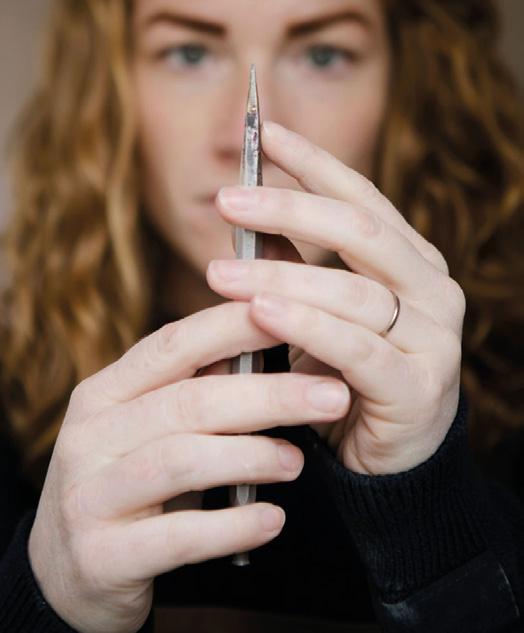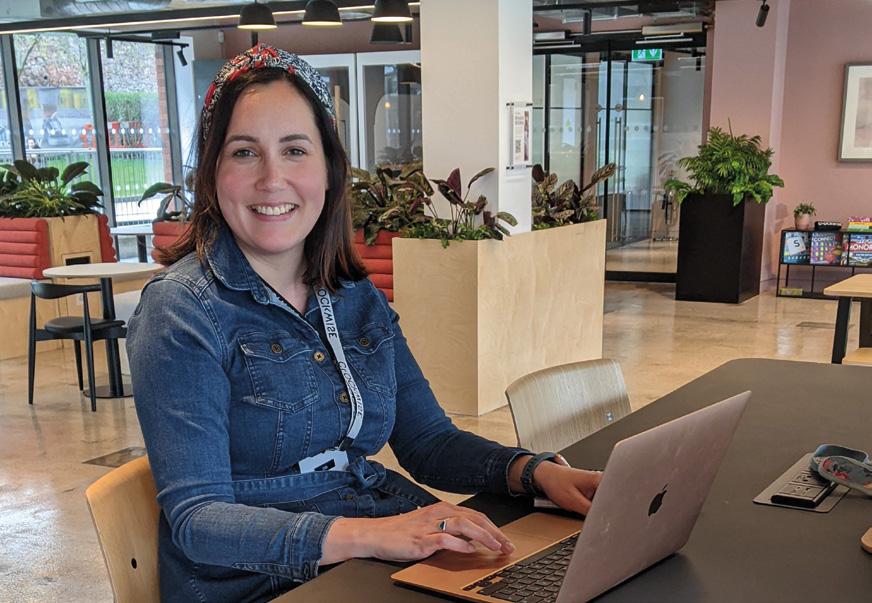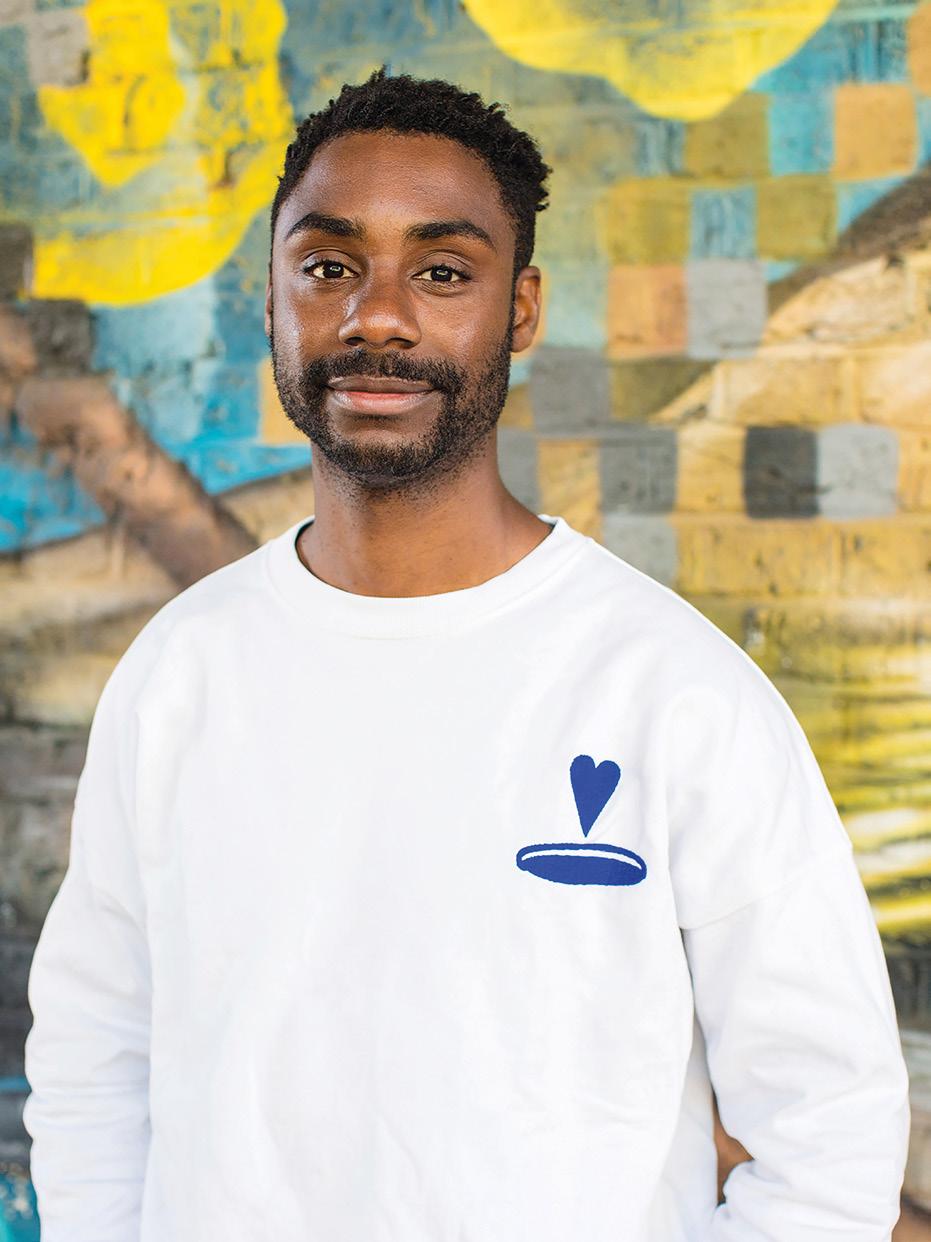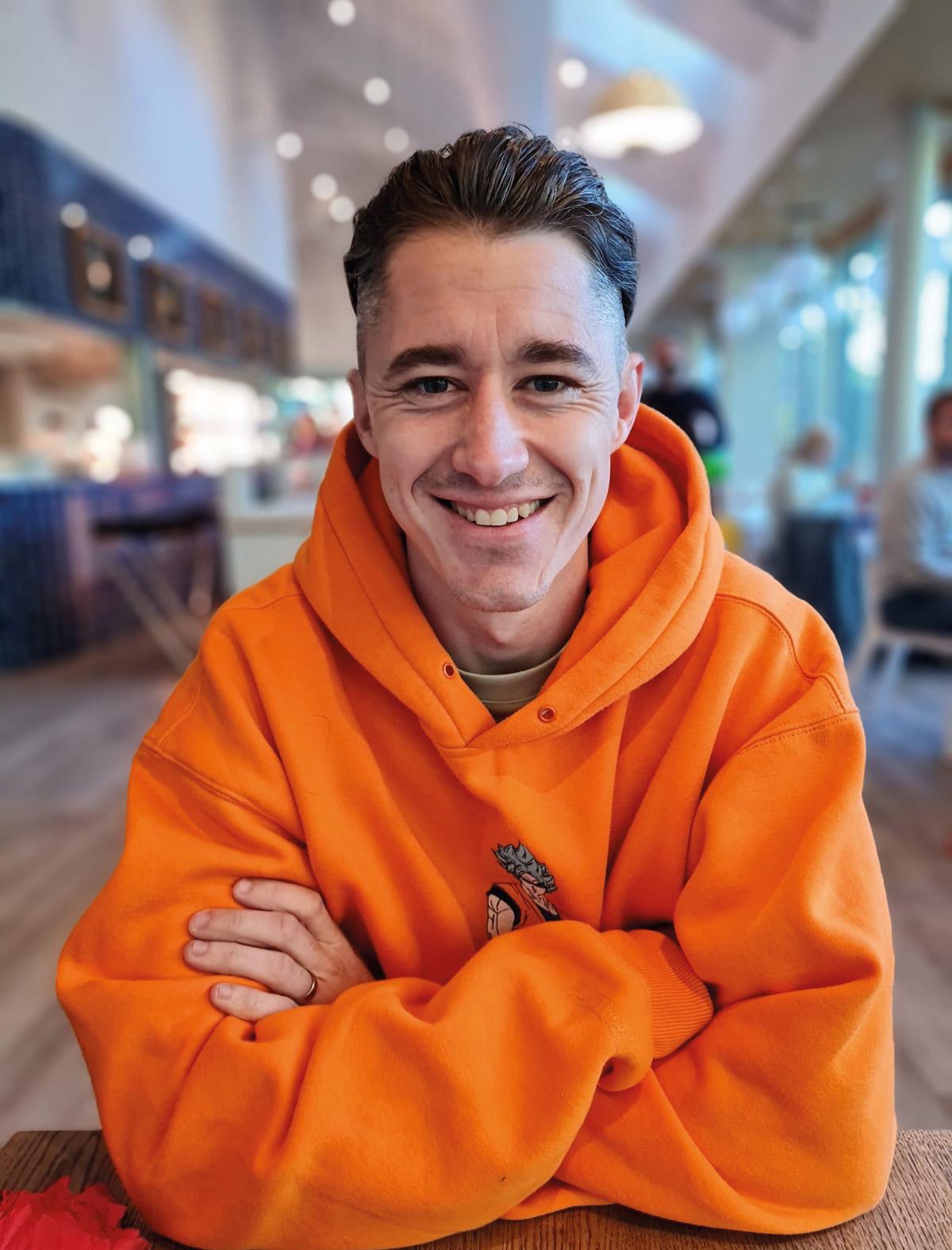
9 minute read
Do Give Day Job Up Your
Can you share details about some of your clients and projects?
I’ve written all the music for the TV hit series First Dates and all spin-offs, the last 15 Louis Theroux films and all of the new Michael Palin series. I’m finishing the music today for a very interesting 90-minute documentary about the war in Ukraine, where they built a wooden booth and took it around Ukraine and Western Europe. Ukrainian women of all ages, from 9 to 90, would go in alone and close the door. When they felt ready to talk about whatever they wanted, they pressed a button to start the camera. No interview whatsoever. The result is tremendous and powerful - and not easy to write for.
Advertisement
What did you do before you made the leap to freelancing?
I was a medical school graduate on a very slow path to specialising in maxillofacial surgery. I had a couple of short stints, which proved very helpful (that was the intention) as a boom operator on a BBC film and as a sales assistant in what used to be Europe’s biggest music instrument dealerTurnkey on Charing Cross Road.
I had to be flexible and learn very fast. For example, in the boom op gig, I was told by the person who hired me, “on the first day of the shoot, observe the other boom op and keep your mouth shut.” Worked like a charm, and it was a super fun month. Plus I had great chats with Bill Nighy and Miranda Richardson. What’s not to like? I also wrote articles about music for film and studio gear for Showreel Magazine (sadly, no longer in publication).
How did you get into what you do now? How do you go from medical school to composer (via cartoonist and scuba diver, as your website ‘About page’ tells me)?
My initial dream (I almost wrongly said “plan” here) was to join an indie band. So, first I tried living in New York. That lasted a month until I joined a band who asked me for my green card as they were about to tour US and Canada.
Take two was to a more realistic London - a city I constantly fall in love with. I joined a band named Lapland, and two years later, it dawned on me that age was going to be an issue. So, I thought what kind of music adventure could I still embark on at 31?
Soundtrack was a random guess but so far, it’s been working like a Swiss clock. I taught myself to read music (thank God for the public library near Victoria train station), record, orchestrate, etc.... and posted an ad offering my clueless services on the board by the door of the London Film School in Covent Garden. A graduate took the bait. The first gigs were very hit and miss (emphasis on the ‘miss’), and payments varied from £20 to a meal at Burger King. I now turn down about four well-paying gigs a month - sometimes more. And write music almost exclusively for projects I’d watch anyway.
How many qualifications do you have… from how many schools?
Medical School at the University of Coimbra (Portugal). Not as useless as people might think. Producers know that I can get them to disappear and make it look like an accident. A brief stint at Jazz School - I founded one at Coimbra University while a student. Sadly I had absolutely no time to practice. My jazz chops are still very, shall we say, avant-garde.
I also have an MA in
Composing for Film from National Film and TV School in Beaconsfield in 2006. There was no music teaching, but learning how to collaborate was an eye-opener. I felt like a fraud and that I didn’t belong there, and wanted to give up after the first two months. Glad I persevered.
What are your earliest memories of getting into music?
I’ve “played” in multiple bands since I was a teenager on the outskirts of Lisbon. Keyboards and later trumpet and sax with Lapland in London. No one in my family ever took an interest in my musical work. This never stopped me from tormenting them with CD compilations of my compositions though. Nothing is fun if it’s too easy.
>
I’ve always been super curious about every single type of musical instrument and have been getting my hands on a pretty broad range, particularly over these past ten years. I probably have over 50 instruments in the studio - you can guess I’m super popular with my next-door neighbours. I normally have to play Tetris with the instrument boxes to reach my bass saxophone, the cellobanjo or my Taisho-koto (imagine if a guitar and a typewriter had a baby). I believe this turned out to be a very useful part of my “voice”. Instead of trying to imitate others, I let my inadequacies lead the way (up to a point). This, sadly, also makes it very difficult to have an assistant. So I have to sleep less for the time being.

Was there a moment when you realisedactually, this could be my job?
Yes. A call from my accountant telling me I had to make this work, or I was going to be in financial trouble.
My first TV gig was writing the music for a documentary with Rupert Everett called Victorian Sex Explorer. It went surprisingly far better than I expected. That won a few awards and I soon got the first calls from new directors asking if I would be available to write music for their documentary. Money was few and far between for a long time but you keep swimming. Get it into your head that you can’t turn back.


What do you prefer about what you do now versus what you used to do?
Helping others, one at a time, through any medical profession is very noble and a wonderful thing to do but I much prefer tormenting thousands at a time with my music. Gratitude is far more important than money to me. Obviously, not at the start of my “career” though. I get a good handful of emails from strangers for almost every single project I score for TV - which are almost on the same level as the odd bouquet of flowers, cake, and wine that some patients would bring me after treatment finished. But then, there’s the extra notch. For example, in at least five UK weddings. brides have walked down the aisle to my First Dates music (and they say romance is dead). In the more serious ones, two people emailed me praising my music for the Grenfell documentary, and said they’ll want that music played at their funeral. Oh, and when I scored the BBC documentary film The Last Miners, about the last coal mine in Britain, the director told the miners that ‘the guy doing the music was the same who did First Dates’ and they all got very excited because their wives loved First Dates.
Having said that, nothing beats being on stage. That’s what I miss about my band days. I’ve recently done nine gigs as a stand-up (open mic nights in London) and the adrenaline buzz is equal to none.
Is there anything worse about what you do now compared to your previous jobs?
Never knowing when the next gig and paycheck will come from. But that has now gone to a large extent. The opposite is an issue sometimes. You get a few gigs coming at the same time and have to say no to some, fearing whoever they get might (likely) do a better job, and that’s that director gone for future gigs. Also, there is no union or body to protect your rights.
Have you got a funny or weird freelancing/ client story you can share?
Submitting the wrong pitches (swapped over) to two clients. As in, sending completely inappropriate music for their very different projects and then discovering I landed both gigs!
On the episode of BBC TV drama Merlin I scored, I picked up a viola for the first time.
Needless to say, much as I tried, I couldn’t make it sound like a viola. The notes I got back were in praise of the fantastic authentic Celtic fiddle sound that was very adequate for the druid kid. Who was I to say otherwise?

But maybe my finest hour was while driving and taking a call from a producer on a handsfree phone. My wife was in the passenger seat and more aware of the situation. As I approached a busy roundabout, my attention had to go fully to the other vehicles. This was in the middle of the producer asking me if it was ok for them to keep 90% of the publishing rights on the music I was going to write for their series. It took ages to negotiate the sneaking through traffic so I was silent for a good while. He perceived this as me being insulted by that percentage, so proceeded to go down: “80%?”...silence... “75-25?”...silence. By the time my brain switched back to the call, post roundabout, we were on 50-50, which was beyond great for me. The lesson I took from this was: the less I talk, the better my life progresses.
How do you design your days?
I don’t. Being part Iberian, part North African I like to play it by ear (no pun intended). I’m a firm believer that, as long as there is enough coffee, everything will eventually slot into place.


Procrastination dictates the various creative ways I find to waste time. Until I do 90% of the work one hour before the deadline while swearing at the computer.
How important is it to keep your mental health in shape?
You have to deal with very demanding people who easily forget their deadline has slipped a few weeks down the line and is now clashing with other jobs you have. Everyone likes to think your time is exclusive to them. At the moment, I’m on - by no fault of my own - two TV series and two feature documentaries. Some days I get asked to provide new music, comments and time for meetings for all four.
Staying creative and polite can be a challenge, so I clean up my headspace mostly with sailing - on the Thames and in the Docklands. It’s cheap and your immune system gets a boost every time you fall in the water. I also have several hobbies that take me as far from music as possible, like building little autonomous robots, which I code on Arduino [opensource electronics platform] and other similar crazy stuff that drives my family nuts.
Coping strategies can be quite handy. It’s a lonely job where you are constantly competing with people who are sometimes a lot more skilled at networking, social media, and knowing the right people. You also need to be able to take criticism from people who can be pretty brutal. And you should be polite to those who are not - I must admit I’m still trying to find the instruction manual on that last one. Look after your self-esteem.
How have you found clients?
I don’t. The few times I tried, I wasn’t successful. And as soon as I stopped trying, the calls started coming in. I am aware that luck has probably played the role of an agent (never had one) in my career. It’s mostly word of mouth. Having my name, a lot of times, as the first thing that comes up on TV at the end of a show doesn’t hurt either.
At the very start, I contacted dozens of directors doing their first short films - to write the music for no fee. Some of those turned out to be editors (as day jobs) and some got me a gig or two. It eventually snowballed.

What advice would you give anybody thinking about making the jump to freelancing?
Don’t think about the pros and cons. Just do it. There’s nothing worse than thinking at retirement: “I could have...” I took the plunge, even without any promising signs of talent. That comes later through work and luck. If it doesn’t work out, then be proud you tried.
Top: Boom op with Bill Nighy

Middle: With Michael Palin

Bottom: With Louis Theroux

There’s advice which maybe is more specific to TV. For example, don’t accept really bad deals when you know they can pay decently (easier to say/do when you are not desperate). Know your worth. If you don’t help hold the line, it’s a race to the bottom. Try and find what can make you stand out from the crowd and the increasing background noise. Keep learning and trying to push the envelope on every job you do. Explore your limitations. Treat everyone with respect - they are trusting you with something that has their name on it and sometimes their savings. And (this one is very niche) above all, try to have fun. I always say that - the day I feel like a have a job, I’m doing it wrong. ●
Find









